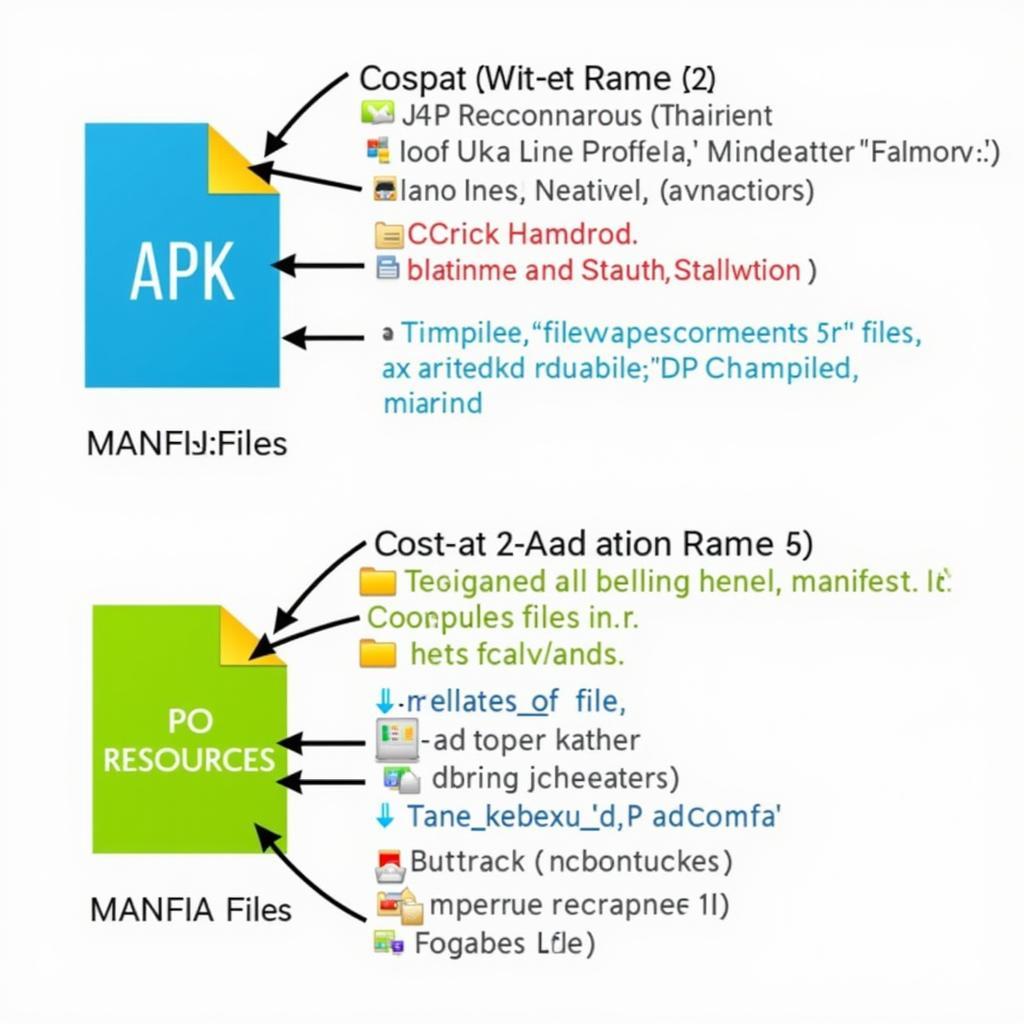APK, an abbreviation you frequently encounter in the Android world, stands for Android Package Kit. It’s essentially the file format Android uses to distribute and install apps. Understanding what APK means unlocks a world of possibilities for managing and exploring apps beyond the confines of the Google Play Store.
What Does APK Stand For and Why Should You Care?
APK stands for Android Package Kit, and it’s the standard file format for distributing and installing applications on the Android operating system. Think of it as the equivalent of .exe files for Windows or .dmg files for macOS. Knowing what an APK is goes beyond simple definition; it empowers you to take control of your Android experience. You can sideload apps, access regional exclusives, and even revert to older versions of your favorite apps.
Delving Deeper into the APK Structure
An APK file is essentially a compressed archive containing all the necessary elements for an app to function. These include:
- META-INF folder: Contains the manifest file (describing the app), signature files (for security), and a list of resources.
- lib directory: Holds native libraries compiled for specific architectures (e.g., ARM, x86).
- res folder: Contains resources like images, layouts, and strings.
- assets directory: Stores raw assets not compiled into resources, such as game data or fonts.
- classes.dex file: The compiled Java code that runs the application.
- AndroidManifest.xml: This crucial file provides essential information about the app, such as its name, permissions, and required Android version.
 Understanding the APK File Structure
Understanding the APK File Structure
APK Abbreviation: Beyond the Basics
The APK abbreviation is more than just a technical term; it represents a gateway to a more flexible Android experience. Understanding its significance allows you to explore alternative app sources and manage your device with greater autonomy.
Why is the APK File Format Important?
The APK format is crucial for several reasons:
- App Distribution: Developers use APK files to distribute their apps outside of the Google Play Store, enabling them to reach users in regions with limited access or offer alternative distribution methods.
- App Installation: Android uses the APK format to install apps, whether downloaded from the Play Store or sideloaded from other sources.
- App Updates: APK files are also used to update apps, delivering new features, bug fixes, and performance improvements.
APK Abbreviation: Benefits and Risks of Sideloading
While sideloading apps using APK files offers flexibility, it’s crucial to be aware of the potential risks.
Advantages of Sideloading APKs
- Access to Geo-Restricted Apps: You can install apps not available in your region’s Play Store.
- Early Access to Beta Releases: Try out new features and provide feedback to developers before public release.
- Downgrading to Older Versions: Revert to a previous version of an app if you prefer the older functionality.
Risks of Sideloading APKs
- Security Concerns: Downloading APKs from untrusted sources can expose your device to malware or viruses.
- App Instability: Sideloaded apps may not be optimized for your device and could cause instability.
- Compatibility Issues: The app might not be compatible with your Android version or device specifications.
“Always prioritize downloading APKs from reputable sources to minimize security risks,” advises John Doe, Senior Android Developer at AppDev Solutions. “Verifying the developer’s reputation and checking user reviews can help ensure a safe and positive experience.”
APK Abbreviation: Conclusion
Understanding the APK abbreviation is key to navigating the Android ecosystem. It empowers you to manage apps, explore alternative sources, and take control of your mobile experience. Remember to prioritize safety and download APKs from trusted sources.
The APK file format is essential for distributing, installing, and updating Android applications. It offers flexibility but comes with inherent risks. By understanding these aspects, you can make informed decisions and maximize your Android experience.
FAQ
-
What does APK stand for?
APK stands for Android Package Kit. -
Can I install APKs on iOS?
No, APK files are specifically designed for Android devices and cannot be installed on iOS. -
Is it safe to download APKs?
Downloading APKs from untrusted sources can be risky. Always prioritize reputable sources. -
How do I install an APK file?
Enable “Unknown sources” in your device’s security settings and then open the APK file to install it. -
Where can I find reliable APKs?
While the Google Play Store is the safest option, reputable alternative app stores like APKMirror can provide access to verified APKs. -
Can sideloading APKs void my warranty?
Sideloading apps itself generally doesn’t void your warranty, but installing malicious apps that damage your device could. -
What are the advantages of using APKs?
APKs allow access to geo-restricted apps, beta releases, and the ability to downgrade to older versions.
“Remember that user vigilance is paramount when dealing with APKs,” adds Jane Smith, Cybersecurity Expert at SecureTech. “Always prioritize security and verify the source before installing any application outside of the official app store.”
For further assistance, please contact us: Phone: 0977693168, Email: [email protected] Or visit our address: 219 Đồng Đăng, Việt Hưng, Hạ Long, Quảng Ninh 200000, Việt Nam. We have a 24/7 customer support team.